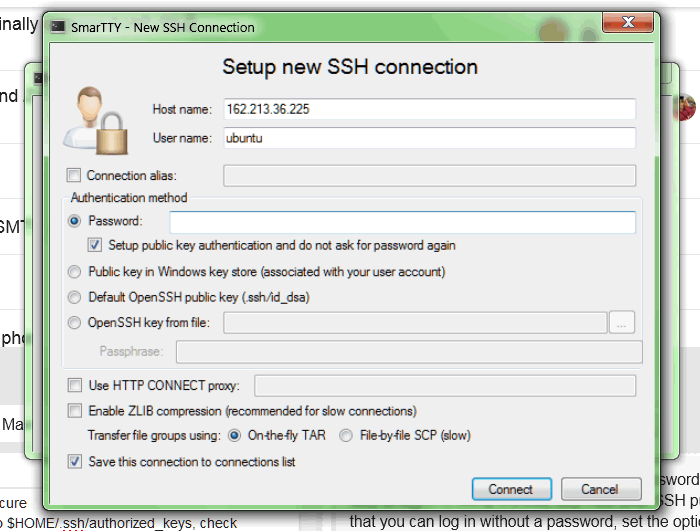I have been researching this topic and can’t find a solution that works for me. I currently have version 23c installed. Everything was working fine until I tried to use SmarTTY on my Windows machine to access my MIAB server via SSH (Putty breaks Windows explorer on my Win7 machine). All of a sudden, any SSH connections were actively refused and I consistently got “Oops! Something went wrong!” error messages while loading the status check page. I lease my server from CloudSigma and the only way I could access the server was using their NoVNC tunnel.
The only way I was able to finally resolve the issue was to use apt-get to uninstall and purge openssh-server and then install it again. Then I as able to log in via SSH using a password. Of course, I then got the following error message from the box:
The SSH server on this machine permits password-based login. A more secure
way to log in is using a public key. Add your SSH public key to $HOME/.ssh/authorized_keys, check
that you can log in without a password, set the option ‘PasswordAuthentication no’ in
/etc/ssh/sshd_config, and then restart the openssh via ‘sudo service ssh restart’.
So I did a copy-ssh-id and set the option “PasswordAuthentication” to no and restarted the ssh server. I got the “Oops” error again and nothing loaded. I also couldn’t get the key authentication to work using SmarTTY. I tried setting the option back to yes, but that still didn’t fix things. The only way I could access the status check page again was to go through the uninstall, purge, reinstall routine again.
As it stands now, I have SSH reinstalled with the default sshd_config in place and getting the red “permits password-based login” error. In SmarTTY, I set it up so that I entered the password once and checked the option box (see attached).
Is this a known issue? How should the sshd_config file be edited to make it work correctly? It currently looks like this:
# Package generated configuration file
# See the sshd_config(5) manpage for details
# What ports, IPs and protocols we listen for
Port 22
# Use these options to restrict which interfaces/protocols sshd will bind to
#ListenAddress ::
#ListenAddress 0.0.0.0
Protocol 2
# HostKeys for protocol version 2
HostKey /etc/ssh/ssh_host_rsa_key
HostKey /etc/ssh/ssh_host_dsa_key
HostKey /etc/ssh/ssh_host_ecdsa_key
HostKey /etc/ssh/ssh_host_ed25519_key
#Privilege Separation is turned on for security
UsePrivilegeSeparation yes
# Lifetime and size of ephemeral version 1 server key
KeyRegenerationInterval 3600
ServerKeyBits 1024
# Logging
SyslogFacility AUTH
LogLevel INFO
# Authentication:
LoginGraceTime 120
PermitRootLogin without-password
StrictModes yes
RSAAuthentication yes
PubkeyAuthentication yes
#AuthorizedKeysFile %h/.ssh/authorized_keys
# Don't read the user's ~/.rhosts and ~/.shosts files
IgnoreRhosts yes
# For this to work you will also need host keys in /etc/ssh_known_hosts
RhostsRSAAuthentication no
# similar for protocol version 2
HostbasedAuthentication no
# Uncomment if you don't trust ~/.ssh/known_hosts for RhostsRSAAuthentication
#IgnoreUserKnownHosts yes
# To enable empty passwords, change to yes (NOT RECOMMENDED)
PermitEmptyPasswords no
# Change to yes to enable challenge-response passwords (beware issues with
# some PAM modules and threads)
ChallengeResponseAuthentication no
# Change to no to disable tunnelled clear text passwords
#PasswordAuthentication yes
# Kerberos options
#KerberosAuthentication no
#KerberosGetAFSToken no
#KerberosOrLocalPasswd yes
#KerberosTicketCleanup yes
# GSSAPI options
#GSSAPIAuthentication no
#GSSAPICleanupCredentials yes
X11Forwarding yes
X11DisplayOffset 10
PrintMotd no
PrintLastLog yes
TCPKeepAlive yes
#UseLogin no
#MaxStartups 10:30:60
#Banner /etc/issue.net
# Allow client to pass locale environment variables
AcceptEnv LANG LC_*
Subsystem sftp /usr/lib/openssh/sftp-server
# Set this to 'yes' to enable PAM authentication, account processing,
# and session processing. If this is enabled, PAM authentication will
# be allowed through the ChallengeResponseAuthentication and
# PasswordAuthentication. Depending on your PAM configuration,
# PAM authentication via ChallengeResponseAuthentication may bypass
# the setting of "PermitRootLogin without-password".
# If you just want the PAM account and session checks to run without
# PAM authentication, then enable this but set PasswordAuthentication
# and ChallengeResponseAuthentication to 'no'.
UsePAM yes
Any help would be greatly appreciated!
